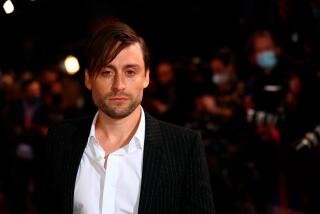Review: In HBO’s sharply written ‘Succession,’ corporate life is a brutal family affair
In “Succession,” premiering Sunday on HBO, the formidable Brian Cox (“Churchill”) plays Logan Roy, the aging head of the “fifth-largest media conglomerate in the world.” He’s a little like Rupert Murdoch, then, as a healthier-looking Scots American.
As Logan turns 80, son Kendall (Jeremy Strong) believes or has been led to believe that control of the company will imminently come to him. (He has come back from some rehab-colored time in the wilderness.) Kendall’s brother Roman (Kieran Culkin) would like to be running the conglomerate’s Hollywood division (“As you know,” he says, “I’m quite an innovative thinker and I was met with a lot of resistance.”) Sister Siobhan, called Shiv (Sarah Snook), works outside the company, as a political strategist of no discernible personal convictions, while oldest son Connor (Alan Ruck), from an earlier marriage, is mostly concerned with avoiding conflict and responsibility.
It’s as if Lear, on the verge of dividing his kingdom, changed his mind and decided to stick around a while longer, while his kids jockey for position or plot coups or pick flowers. But there’s no Cordelia here, no child whose love for her father, in the waning and waxing of his faculties, is simple and true and untainted by concerns of personal gain. Power is what matters.
The series was created by Jesse Armstrong, whose credits are mostly in comedy, and very good ones (“Peep Show,” “The Thick of It”), and whose yet-to-be-produced screenplay “Murdoch” made some noise back in 2010. Adam McKay, who directed the pilot and serves as an executive producer along with Funny or Die cohort Will Ferrell, also comes from comedy, of an often silly sort — though his 2015 film “The Big Short,” tackled the subprime mortgage crisis.
It’s a thin, dotted line that separates dark comedy from satirical drama, and “Succession,” which sits atop it, leans discernibly toward the serious. The distinctions are subtle — with just a slight adjustment of speed or a change in casting or background music, these lines can change their valence, losing or gaining a laugh. A jerk in drama is different company from a jerk in comedy, and these are mostly the dramatic sort. Their jokes, made largely at one another’s expense, are funny to them, but not necessarily to us.
Such comic relief as we are afforded comes from Logan’s nephew Greg (Nicholas Braun), not the series’ most central character but in some ways its most valuable one. Goodhearted, tractable and slow to catch on, Greg — first seen failing as a trainee at one of the corporation’s theme parks — becomes involved in the family skulduggery only from the same mixture of affability and confusion that rules the rest of his actions.
He falls under the questionable supervision of Shiv’s turtleneck-wearing presumptive fiancé, Tom (Matthew Macfadyen), a senior executive by title and a courtier by temperament, who tells him, “Here’s the thing about being rich. … It’s like being a superhero, only better. You get to do what you want; the authorities can’t really touch you. You get to wear a costume, but it’s designed by Armani.”
In what I hope is not a completely accurate representation of corporate life at the highest level, the men tend to be aggressive and vulgar — the only adverb they know, seemingly, begins with an “f” — in old-fashioned or new-fangled ways. (“Dude” becomes a weaponized word here.) When they are vulnerable, it is not necessarily a pretty picture. The female characters, including Logan’s third wife, Marcia (Hiam Abbass), are more inscrutable and, perhaps just for the moment, more likable.
Familiarity with Armstrong’s earlier work would not lead one to expect any kind of redemption scenario, and indeed, some characters who seem not completely horrible at first get a little horrible later on. There is little sense of the reverse — that some of them might become better people before this is over. (I have three episodes, out of 10, yet to see.) But there is a silver lining — as there was hope for a time that the Soprano family might wake up to a better version of themselves, until it became clear that no such version existed.
Nevertheless, this series, like that one, is sharply written and expertly played. The characters are individual enough to feel original, however much they may adhere to type, and Armstrong’s dialogue, layered and overlapping at times in the manner of Robert Altman, nicely models the way people talk around things, the poker game that is human conversation. If Logan is the most straightforward, it is only because he sits atop the pyramid, looking down; but that he says what he means does not mean that what he has to say is good, defensible or even true.
And as with “The Sopranos” and other antiheroic epics of modern television drama, your taste for “Succession” will depend largely on whether you find such communities’ self-serving dysfunction more entertaining than frustrating, or vice versa. For my part, two-thirds of the way through the season, I have not been roused to care much about their individual or collective fates, even when the suspense is dialed up. That is not to say their wriggling is without interest — indeed, seen from the ranks of the 99%, there’s even a certain pleasure in it.
‘Succession’
Where: HBO
When: 10 p.m. Sunday
Rating: TV-MA (may be unsuitable for children under the age of 17)
Follow Robert Lloyd on Twitter @LATimesTVLloyd
ALSO
Brian Cox’s towering performance in ‘Churchill’ is worthy of the great man himself
In ‘Billions,’ Damian Lewis and Paul Giamatti are alpha males doing battle
The do’s and don’ts of reboots: ‘Dynasty’ edition
More to Read
The complete guide to home viewing
Get Screen Gab for everything about the TV shows and streaming movies everyone’s talking about.
You may occasionally receive promotional content from the Los Angeles Times.







